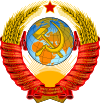| ||
|---|---|---|
|
Former General Secretary of the CPSU Secretariate (1985–1991)
Presidency (1990–1991)
Foreign policy Post-leadership
Media gallery |
||
New political thinking (or simply new thinking)[a] was the doctrine put forth by Mikhail Gorbachev as part of his reforms of the Soviet Union. Its major elements were de-ideologization of international politics, abandoning the concept of class struggle, priority of universal human interests over the interests of any class, increasing interdependence of the world, and mutual security based on political rather than military instruments. The doctrine constituted a significant shift from the previous principles of the Soviet foreign politics.[2][3][4]
YouTube Encyclopedic
-
1/3Views:486 2009892 208 290
-
Perestroika & Glasnost (The End of the Soviet Union)
-
The Enlightenment: New Political Thought
-
POLITICAL THEORY - John Locke
Transcription
History
In 1987 Gorbachev published the book Perestroika and New Political Thinking[5] and in December 1988 he presented the doctrine of new thinking in his speech to the United Nations.[2][6]
The "new thinking" was of vital necessity for the Soviet Union to shut down the costly Cold War competition in order to continue the internal economic reforms of perestroika.[3]
Notable steps in this direction included the Intermediate-Range Nuclear Forces Treaty, Soviet withdrawal from Afghanistan, end of support of communist movements around the world and loosened the Soviet grip over Eastern Europe by replacing the Brezhnev Doctrine with the Sinatra Doctrine.[3]
In 1990 Gorbachev was awarded the Nobel Prize for Peace "for his leading role in the peace process".
The overall effect of these developments was the end of the Cold War and the breakdown of the Warsaw Pact and ultimately of the Soviet Union itself.[3]
Notes
- ^ Gorbachev was known to often put an incorrect stress in words. As a notable peculiarity, Gorbachev pronounced the term as "но́вое поли́тическое мы́шление", while the common Russian stress is мышле́ние (contrary to speculations, Gorbachev's version of stress was also attested in dictionaries, but as a less common)[1]
References
- ^ Мы́шление: как Михаил Горбачев изменил русский язык
- ^ a b "Gorbachev's New Thinking", by David Holloway, Foreign Affairs, vol.68 no.1
- ^ a b c d "Gorbachev and New Thinking in Soviet Foreign Policy, 1987-88", USDOS archive
- ^ New Thinking: Foreign Policy under Gorbachev, in: Glenn E. Curtis, ed. Russia: A Country Study, Washington: GPO for the Library of Congress, 1996.
- ^ Горбачев М. С. Перестройка и новое мышление для нашей страны и всего мира — М.: ИПЛ, 1987
- ^ Excerpts from the Address by Mikhail Gorbachev, 43rd U.N. General Assembly Session, December 7, 1988


